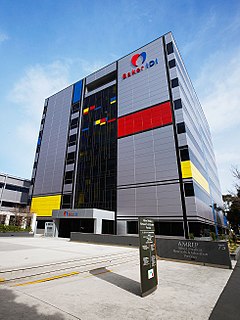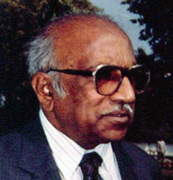The National Heart, Lung, and Blood Institute (NHLBI) is the third largest Institute of the National Institutes of Health, located in Bethesda, Maryland, United States. It is tasked with allocating about $3.6 billion in FY 2020 in tax revenue to advancing the understanding of the following issues: development and progression of disease, diagnosis of disease, treatment of disease, disease prevention, reduction of health care disparities within the American population, and advancing the effectiveness of the US medical system. NHLBI's Director is Gary H. Gibbons (2012–present).

The American College of Cardiology (ACC), based in Washington, D.C., is a nonprofit medical association established in 1949. It bestows credentials upon cardiovascular specialists who meet its qualifications. Education is a core component of the college, which is also active in the formulation of health policy and the support of cardiovascular research.

The British Heart Foundation (BHF) is a cardiovascular research charity in the United Kingdom. It funds medical research related to heart and circulatory diseases and their risk factors, and runs influencing work aimed at shaping public policy and raising awareness.

Singapore General Hospital is an academic health science centre as well as a tertiary referral hospital in Singapore, located next to the Bukit Merah and Chinatown districts of the Central Region. It is located close to the Outram Community Hospital (OCH), which functions as a supplementary community and rehabilitation hospital to the SGH for newly discharged patients. There is also the Outram Polyclinic to complement outpatient care. All of these institutions are operated by SingHealth, which comes under the purview of the Singaporean government's Ministry of Health (MOH).
Workplace wellness is any workplace health promotion activity or organizational policy designed to support healthy behavior in the workplace and to improve health outcomes. Known as 'corporate wellbeing' outside the US, workplace wellness often comprises activities such as health education, medical screenings, weight management programs, on-site fitness programs or facilities. There are many crucial components of wellness in the workplace.

Sree Chitra Tirunal Institute for Medical Sciences & Technology (SCTIMST), Trivandrum, is an Institution of National Importance established by an Act of Parliament in 1980. It is under the Department of Science and Technology, Government of India, with an Institute Body and a Governing Body constituted as per the provisions of the Sree Chitra Tirunal Institute for Medical Sciences & Technology, Trivandrum, Act, 1980. The Institute presents a unique model by connecting the different strands of Clinical Medicine, Biomedical Technology and Public Health to produce a seamless continuum of indisputable relevance to society.

The Indian Council of Medical Research (ICMR), the apex body in India for the formulation, coordination and promotion of biomedical research, is one of the oldest and largest medical research bodies in the world.

Bernard Lown was a Lithuanian-American cardiologist and inventor. Lown was the original developer of the direct current defibrillator for cardiac resuscitation, and the cardioverter for correcting rapid disordered heart rhythms. He introduced a new use for the drug lidocaine to control heartbeat disturbances.
The Russian American Medical Association (RAMA) is a non-profit organization of Russian American physicians founded in 2002 with a mission to facilitate and enable Russian American physicians and health care professionals to excel in patient care, teaching and research, and to pursue their aspirations in professional, humanitarian and community affairs. RAMA is partnering with a number of professional organizations, including such key collaborators as Russian American Dental Association, Russian American Scientists Association (RASA) and American Business Association of Russian Professionals (AmBAR). This and other partnerships foster collaboration among doctors, scientists, entrepreneurs, and medical researchers of European, American and Asian descent in the areas of medical education, biomedical and clinical research, as well as innovation and improvement of health care.
Washington University in St. Louis has a broad array of centers for particular studies and research institutes. The following summary of many of these is organized by general field of inquiry.
The Canadian Cardiovascular Society (CCS) is the national voice for cardiovascular physicians and scientists in Canada. The CCS is a membership organization that represents more than 1,800 professionals in the cardiovascular field. Its mission is to promote cardiovascular health and care through knowledge translation, professional development and leadership in health policy.
The National Institute of Virology in Pune, India is an Indian virology research institute and part of the Indian Council of Medical Research (ICMR). It was previously known as 'Virus Research Centre' and was founded in collaboration with the Rockefeller Foundation. It has been designated as a WHO H5 reference laboratory for SE Asia region.

The Libin Cardiovascular Institute is a partnership between Alberta Health Services and the University of Calgary. Its mandate comprises all cardiovascular research, education and service delivery, with a service area extending from Saskatchewan, Southern Alberta and Eastern British Columbia. The Institute coordinates the activities of over 1,500 individuals in Southern Alberta. Of its more than 175 research and clinician members, over 75 are cardiologists, making it the largest heart or cardiovascular institute in Western Canada by that measure.

The European Society of Cardiology (ESC) is an independent non-profit, non-governmental professional association that works to advance the prevention, diagnosis and management of diseases of the heart and blood vessels, and improve scientific understanding of the heart and vascular system. This is done by:

The Baker Heart and Diabetes Institute, commonly known as the Baker Institute, is an Australian independent medical research institute headquartered in Melbourne, Victoria. Established in 1926, the institute is one of Australia's oldest medical research organisations with a historical focus on cardiovascular disease. In 2008, it became the country's first medical research institute to target diabetes, heart disease, obesity and their complications at the basic, clinical and population health levels.

Jose Chacko Periappuram is an Indian cardiac surgeon and medical writer who performed the first successful heart transplant in the state of Kerala, India, as well as the first successful heart retransplant in the country. His other achievements include the first beating heart, awake bypass and total arterial revascularization surgeries in the state. Periappuram is a fellow of the Royal College of Surgeons of Edinburgh, the Royal College of Surgeons of Glasgow and the Royal College of Surgeons of London. He is the founder and Chairman of "Heart Care Foundation", a charitable trust that financially assists poor heart patients. The Government of India awarded him the Padma Shri, the fourth highest civilian award, in 2011.
The European Association for Cardio-Thoracic Surgery (EACTS) is a membership organisation devoted to the practice of cardiothoracic surgery. The mission statement of the association is to advance education in the field of cardiac, thoracic and vascular interventions; and promote research into cardiovascular and thoracic physiology, pathology and therapy, with the aim to correlate and disseminate the results for the public benefit. Within the EACTS there is a large number of committees working on various issues in order to improve cardio-thoracic surgery.

The Indian Heart Association (IHA), along with the Indian Stroke Association (ISA), is an organization dedicated to raising cardiovascular and stroke health awareness among the South Asian population. The organisation was founded by Harvard Medical School and Berkeley-UCSF affiliates Dr. Sevith Rao and Dr. Sishir Rao. The organization has sponsored and conducted cardiac health camps in India to raise awareness about cardiovascular disease and is headquartered in Jubilee Hills, Hyderabad, India.

Nagarur Gopinath was an Indian surgeon and one of the pioneers of cardiothoracic surgery in India. He is credited with the first successful performance of open heart surgery in India which he performed in 1962. He served as the honorary surgeon to two Presidents of India and was a recipient of the fourth highest Indian civilian award of Padma Shri in 1974 and Dr. B. C. Roy Award, the highest Indian medical award in 1978 from the Government of India.

Cerebrovascular diseases in Australia are a major health issue. Cerebrovascular disease is a significant challenge to Australia due to it being a prominent cause of death in Australians and the difficulties it poses for carers and the health system in addition to individuals with cerebrovascular disease. Stroke is the deadliest cerebrovascular disease in Australia accounting for 84.24% of all deaths caused by cerebrovascular diseases. The death rate of cerebrovascular diseases is decreasing, with cerebrovascular disease in 2008-2018 falling from the third to fourth leading cause of death for men and second to third leading cause of death for women during this time period. In 2015, stroke was the tenth leading cause of burden of disease, accounting for 2.7% of the overall burden. This cause of disease burden has decreased from 2003-2015 with stroke falling from the second leading cause of disease burden to the tenth during this time period. Aboriginal and Torres Strait Islander people and people from low-socioeconomic areas experience higher rates of prevalence and mortality from stroke than non-Indigenous Australians.













